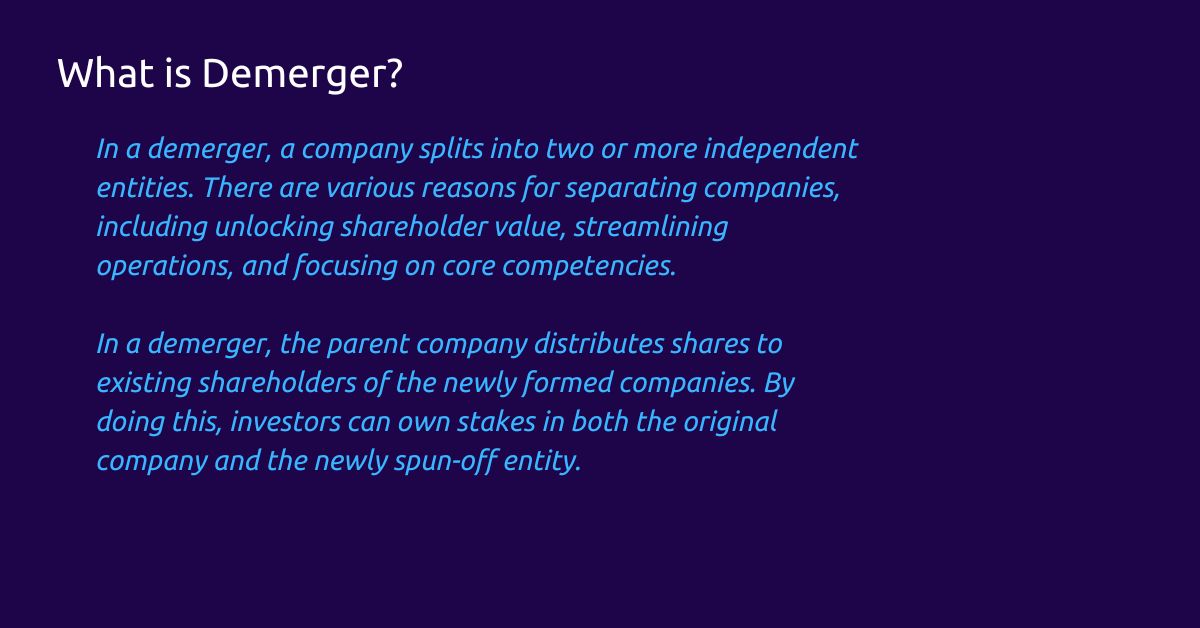The past few years have seen several high-profile demergers that have reshaped industries. In order to understand the potential benefits and challenges of demergers, we must examine the rationale behind these corporate splits. The purpose of this blog post is to explore demergers, examine real-world examples, and discuss the implications for investors and businesses.
What is Demerger?

In a demerger, a company splits into two or more independent entities. There are various reasons for separating companies, including unlocking shareholder value, streamlining operations, and focusing on core competencies.
In a demerger, the parent company distributes shares to existing shareholders of the newly formed companies. By doing this, investors can own stakes in both the original company and the newly spun-off entity.
Types of Demerger
There are primarily two types of demergers:
1. Statutory Demerger:
- Direct Dividend Demerger: As a dividend, the parent firm gives its shareholders shares of the combined company directly.
- Three-Cornered Demerger: The demerged business is transferred by the parent company to a newly established business, which subsequently issues shares to the shareholders of the parent company.
2. Non-Statutory Demerger:
- Liquidation Demerger: Liabilities and assets are transferred to the demerged businesses by the parent corporation.
- Capital Reduction Demerger: Through the transfer of assets and liabilities to the demerged entities, the parent company lowers its capital.
A number of variables, such as tax implications, legal specifications, and the particular objectives of the demerger, influence the form of demerger that is chosen.
How Demergers Work?
The demerger of a company involves breaking it up into two or more separate entities. It usually starts with identifying specific business units or divisions that could operate more efficiently as standalone companies.
In order to separate these units, a detailed separation plan must be developed, outlining all the legal and financial details. In this plan, assets, liabilities, and employees are distributed between the new entities.
In order to succeed, regulators and shareholders must approve the project. As soon as the demerger has been approved, it is executed, and the new companies begin to operate independently.
It is common for shareholders of the original company to receive shares in the new entity, so that they can continue to invest in the businesses they prefer.
Why Do Companies Demerge?
Businesses demerge for a number of reasons, most frequently to increase their total worth and performance. Here are a few typical explanations:
1. Unlocking Shareholder Value:
- Clearer Valuation: Demergers can help investors better understand and value each business unit separately, potentially leading to higher valuations.
- Attracting Specific Investors: Businesses might draw in investors who are particularly interested in particular industries or business strategies by segmenting their operations.
2. Improved Operational Focus:
- Core Competency Focus: Companies can focus on their core competencies through mergers, which boosts production and efficiency.
- Strategic Flexibility: Smaller, more targeted businesses are better able to respond to shifts in the market and seize expansion prospects.
3. Regulatory Compliance:
- Addressing Antitrust Concerns: Demergers could occasionally be required to avoid undue market concentration and to adhere to antitrust laws.
4. Financial Restructuring:
- Reducing Debt: By separating companies with high debt from those with higher profits, mergers can lessen debt loads.
- Improving Financial Performance: Demerged businesses can lower expenses and increase financial performance by concentrating on their core competencies.
5. Family Business Succession:
- Dividing Assets: In a controlled and tax-efficient way, family members can share assets and liabilities through demergers.
You can better grasp the strategic importance of demergers and their possible effects on businesses and their shareholders by being aware of these factors.
Also Read:
- What Does the ITC Hotels Demerger Mean for Investors?
- Tata Motors Demerger 2025: Should You Buy or Sell After the Demerger?
Advantages and Disadvantages of Demerger
| Feature | Advantages | Disadvantages |
|---|---|---|
| Shareholder Value | Unlocks hidden value by separate valuation | Potential loss of synergies between businesses |
| Operational Focus | Improved focus on core competencies | Increased costs and complexity of operations |
| Financial Performance | Enhanced financial flexibility and efficiency | Potential loss of economies of scale |
| Strategic Flexibility | Greater ability to adapt to market changes | Increased risk and uncertainty for the demerged companies |
| Regulatory Compliance | Compliance with antitrust and other regulations | Significant legal and regulatory hurdles |
| Tax Implications | Potential tax benefits | Complex tax considerations and potential liabilities |
| Employee Morale | Potential for improved employee morale and motivation | Potential job losses or disruptions due to restructuring |
| Market Perception | Positive market perception and increased investor interest | Negative market reaction if the demerger is not well-executed |
How Do Demergers Impact Share Prices?
The price of shares can be affected positively as well as negatively by mergers. Market sentiment, investor expectations, and the perceived value of the demerged entities often determine the immediate impact.
As investors assess the implications of the demerger, share prices may fluctuate in the short term. If the market believes that the demerger will unlock value and improve the performance of the companies, share prices may rise. On the other hand, share prices may fall if the market perceives the demerger as negative, perhaps as a result of concerns about increased costs.
In the long run, demergers affect share prices based on the performance of the demerged entities. The share prices of the new companies are likely to increase if they achieve their strategic goals and deliver strong financial results. It is possible, however, that the share prices of the demerged companies may fall if they struggle.
In each case, the impact of demergers on share prices may vary widely depending on the specifics. There are many factors that can affect the outcome of a demerger, including its size and complexity, the industry sector, and overall market conditions.
What Happens to Stock After Demerger?
The parent company usually distributes shares of the newly formed companies to its existing shareholders after a demerger. The distribution can take the form of a direct dividend or a three-cornered merger.
As soon as the shares are distributed, the shareholders are able to trade them separately on the stock market. Market forces, such as investor demand, company performance, and overall market conditions, will determine the trading price of the shares.
A demerger may not result in the same value for the shares received in the original company as the one received in the demerger. Demerged companies will be valued independently by the market, and their share prices may fluctuate accordingly.
In some cases, the parent company may retain a minority stake in the demerged companies. This allows the parent company to continue to benefit from the performance of the demerged businesses, while also providing the demerged companies with greater autonomy.

